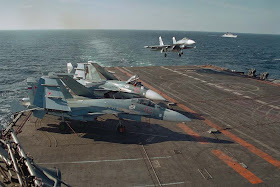Analysis: Russia uses Syrian port to demonstrate its power in the Med
Russia is expanding its military presence in Syria, developing an advanced naval port at Tartus and providing Syria with sophisticated missile technology. The story of Russia's return to Tartus, Syria's second most important port after Latakia, broke a year ago. It is Moscow's only foreign naval outpost situated outside the former Soviet Union. In June 2006 Russian media reported that Moscow had begun dredging at Tartus with a possible eye to turning what was largely a logistical base into a full-fledged station for its Black Sea Fleet, soon to be redeployed from the Ukrainian port of Sevastopol. But Tartus is much more than just a new home for the fleet; it allows projection of Russian power into the entire eastern Mediterranean, and, by extension, a flexing of military might before Israel and the West.Russian sources said the country's military planned to form a squadron to operate in the Mediterranean within three years, built around the Moskva missile cruiser. In addition, several respected Russian newspapers have reported that Moscow planned to deploy an S-300PMU-2 Favorit air-defense system to protect the base, with the system being operated by Russian servicemen rather than by Syrian forces. According to these reports, the system would provide air defense protection for a large part of Syria. Moscow and Damascus have also reached an agreement to modernize Syria's anti-aircraft network by upgrading medium-range S-125 missile complexes that were sold to Syria in the 1980s. Another instance of secret activity at the port came on March 9, 2005, when yet another Russian Black Sea Fleet vessel, the Azov, supposedly carrying machinery for rebuilding the moorage at the Tartus technical base and replacements for obsolete items in the base's storage, left for Syria. When it arrived at the port, several suspicious meetings between local authorities and Russian Navy officers took place, Russian media reported.
Less than two months later, Syria test fired new Scud missiles. The Syrians launched one Scud B missile with a range of 300 kilometers, and two Scud D missiles with a range of 700 kilometers. It is tempting to suggest that technologies for these projectiles were among the "equipment" brought on board the Azov. The Russians have not stopped at moving missiles in their attempt to make an impression in the region. On one occasion they sent fighter planes into Israeli airspace.
In January 1996, the Russian Navy aircraft carrier Admiral Kuznetsov came very close to Israeli territorial waters. On January 27, it launched several advanced Su-33 fighters, the naval version of the Su-27. The jets ventured into Israeli air space near Haifa. IAF planes were scrambled to intercept, but a skirmish was avoided. The incident was kept secret for six years and was only revealed in 2002 in an article in the Israel Air Force magazine. According to the report, Russian planes entered Israel's airspace at least twice and several F-16 scrambled for an intercept mission after an intrusion alert was received.
Source: http://www.jpost.com/servlet/Satelli...cle%2FShowFull

No comments:
Post a Comment
Dear reader,
New blog commentaries will henceforth be posted on an irregular basis. The comment board however will continue to be moderated on a regular basis. You are therefore welcome to post your comments and ideas.
I have come to see the Russian nation as the last front on earth against the scourges of Westernization, Americanization, Globalism, Zionism, Islamic extremism and pan-Turkism. I have also come to see Russia as the last hope humanity has for the preservation of classical western/European civilization, ethnic cultures, Apostolic Christianity and the concept of traditional nation-state. Needless to say, an alliance with Russia is Armenia's only hope for survival in a dangerous place like the south Caucasus. These sobering realizations compelled me to create this blog in 2010. This blog quickly became one of the very few voices in the vastness of Cyberia that dared to preach about the dangers of Globalism and the Anglo-American-Jewish alliance, and the only voice emphasizing the crucial importance of Armenia's close ties to the Russian nation. Today, no man and no political party is capable of driving a wedge between Armenia and Russia. Anglo-American-Jewish and Turkish agenda in Armenia will not succeed. I feel satisfied knowing that at least on a subatomic level I have had a hand in this outcome.
To limit clutter in the comments section, I kindly ask all participants of this blog to please keep comments coherent and strictly relevant to the featured topic of discussion. Moreover, please realize that when there are several "anonymous" visitors posting comments simultaneously, it becomes very confusing (not to mention annoying) trying to figure out who is who and who said what. Therefore, if you are here to engage in conversation, make an observation, express an idea or simply insult me, I ask you to at least use a moniker to identify yourself. Moreover, please appreciate the fact that I have put an enormous amount of information into this blog. In my opinion, most of my blog commentaries and articles, some going back ten-plus years, are in varying degrees relevant to this day and will remain so for a long time to come. Commentaries and articles found in this blog can therefore be revisited by longtime readers and new comers alike. I therefore ask the reader to treat this blog as a historical record and a depository of important information relating to Eurasian geopolitics, Russian-Armenian relations and humanity's historic fight against the evils of Globalism and Westernization.
Thank you as always for reading.